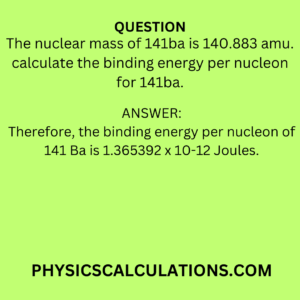Question
The nuclear mass of 141ba is 140.883 amu. calculate the binding energy per nucleon for 141ba.
Answer
The final answer to the above question is 1.365392 x 10-12 Joules

Explanation
Data
The revealed pieces of information from the above question are:
Nuclear mass = 140.883 amu
Since the Barium atom can be written as 14156Ba
Thus,
The number of protons = 56 amu
Number of neutron = 141 – 56 = 85 amu
Hence to find the mass of both protons and neutrons, we will multiply their numbers by 1.00783 and 1.00867 respectively.
Thus,
Mass of protons = 1.00783 x 56 = 56.43848 amu
The mass of neutrons = 1.00867 x 85 = 85.73695 amu
Solution:
Now, to find the mass of a nucleon, we will use the equation below
Mass of Nucleon = mass of proton + mass of the neutron
Thus,
Mass of Nucleon = 56.43848 + 85.73695 = 142.17543 amu
We will now find the mass defect
Mass Defect = Mass of Nucleon – Nuclear mass = 142.17543 – 140.883 = 1.29243 amu
The binding energy (BE) in MeV will now become
BE = 1.29243 x 931 MeV = 1203.25233 MeV
Since the question wants us to calculate the binding energy per nucleon for 141Ba, we will now say:
The binding energy per nucleon for 141 Ba = BE / 141 = (1203.25233) / 141 = 8.5337 MeV
We can further convert the above answer into joules by using 1 MeV = 1.6 x 10-13 J
This implies that
The binding energy per nucleon for 141 Ba = 8.5337 MeV = 8.5337 x 1.6 x 10-13 J = 1.365392 x 10-12 J
Therefore, the binding energy per nucleon of 141 Ba is 1.365392 x 10-12 Joules.
Important Definitions
1. What is Nuclear Mass?
Nuclear mass refers to the total mass of an atomic nucleus, which is composed of protons and neutrons. It is typically measured in atomic mass units (u) and represents the sum of the individual masses of the protons and neutrons within the nucleus. The nuclear mass is a crucial parameter in nuclear physics and plays a fundamental role in determining the stability and energy characteristics of an atomic nucleus.
2. What is Binding Energy?
Binding energy is the amount of energy required to disassemble a nucleus into its individual protons and neutrons, or equivalently, the energy released when these particles come together to form the nucleus. It is a measure of the stability of the nucleus, with higher binding energy indicating greater stability. Binding energy is typically expressed in energy units such as electron volts (eV) or mega electron volts (MeV) and is a key factor in understanding nuclear reactions and the overall behavior of atomic nuclei.
3. What is Nucleon?
A nucleon is a fundamental subatomic particle found in the nucleus of an atom, and it can be either a proton or a neutron. Protons carry a positive electric charge, while neutrons are electrically neutral. Nucleons are integral to the structure of atomic nuclei, contributing to the mass and stability of atoms.
You may also like to read:
The nuclear mass of 37cl is 36.9566 amu. calculate the binding energy per nucleon for 37cl.